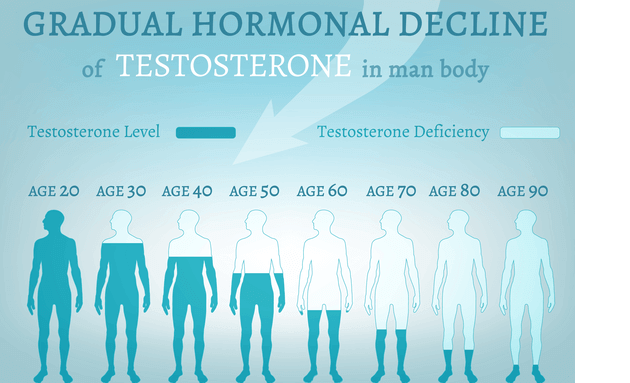
Signs You're Experiencing a Hormone Imbalance (for Men)
Hormonal changes can be difficult to manage, especially if you’re unaware of how the chemicals in your bodywork.
With age, there are changes in your body functions, sleep patterns, and energy levels - which is commonly associated with ‘ageing’. What most people don’t realise is that these changes are caused by what is known as a ‘hormonal imbalance’.
What Is a Hormonal Imbalance?
Hormones are chemicals in your body that are produced by the endocrine glands. Hormones move through your bloodstream to reach the organs and tissues in your body, and regulate functions like:
- Appetite and metabolism
- Sleep cycles
- Heart rate
- Sexual and reproductive functions
- Overall growth and development
- Mood and stress levels
- Body temperature
A hormonal imbalance occurs when your body produces too much or too little of the important hormones in your bloodstream. Although an occasional irregularity is not harmful, a major imbalance can have severe consequences on your health.
What Are the Types of Hormonal Imbalance in Men?

Testosterone is considered the primary male hormone, along with other hormones like cortisol, insulin, and thyroid hormones. Imbalance in any of these hormones may result in any of the 4 main types of hormonal imbalance in men.
-
- Andropause: Low testosterone levels can cause andropause, which is popularly known as ‘male menopause’.
- Adrenal fatigue: Low levels of cortisol, your stress hormone, can cause adrenal fatigue. Often resulting from long exposures to stress.
- Hypothyroidism: Underactive thyroid gland leading to low production of thyroid hormones, can cause hypothyroidism. Learn more about what hypothyroidism can do to your body.
- Hyperthyroidism: An overactive thyroid gland can increase your metabolism and produce high levels of thyroid hormone. It can be surgically removed if necessary. Learn more here.
- Andropause: Low testosterone levels can cause andropause, which is popularly known as ‘male menopause’.
What Are the Signs You’re Experiencing a Hormone Imbalance?

Everyone experiences fluctuations in their hormones across the course of their lives. It may occur when your endocrine system is not functioning optimally.
The endocrine glands are responsible for producing, storing, and releasing hormones into your blood. Multiple endocrine glands control different aspects of your body functions, and can present symptoms like:
- Sudden, unexplained weight loss
- Excessive sweating
- Difficulty sleeping and headaches
- Changes in heat and cold sensitivity
- Dry skin or skin rashes
- Changes in heart rate and blood pressure
- Irritability, anxiety, depression
- Increased thirst and frequent urination
- Brittle or weak bones
- Unexplained, prolonged fatigue
What Causes Hormonal Imbalance?
There are multiple reasons attributed to hormonal imbalance in men. The main causes include:
- Prolonged exposure to chronic stress
- Type 1 and type 2 diabetes
- Hyperglycemia and hypoglycemia
- Hypothyroidism and hyperthyroidism
- Poor diet and nutrition
- Being overweight, obese, or anorexic
- Birth control or hormonal replacement drugs
- Overuse of steroids
- Solitary thyroid nodules and cysts
- Pituitary tumours, benign tumours, Cancer, and Cancer treatment
- High or low levels of cortisol (Cushing’s Syndrome or Addison’s Disease)
- Iodine deficiency
- Endocrine gland injury
- Hereditary pancreatitis
5 Ways to Naturally Balance Your Hormones

Hormonal imbalances are common in today’s day and age, because of our fast-paced lifestyles and poor food and exercise habits.
However, there are ways to naturally keep your hormones balanced. Here are some tips that will help you get started:
- Add enough protein to your meals - Proteins provide essential amino acids in your body that help maintain muscle, skin, and bone health. Furthermore, protein affects the release of hormones ghrelin and leptin, that control appetite.
- Indulge in regular physical exercise - Physical exercise helps reduce insulin levels in your body and is beneficial to hormone regulation.
- Skip the refined sugar and carbs - Keep your sugar and carb levels in check to avoid developing diabetes, obesity, and other diseases.
- Manage stress effectively - The two major hormones affected by stress are cortisol and adrenaline. Try to allocate some time in your day to do things that help reduce your stress levels.
- Consume healthy fats - Include high-quality natural fats like fatty fish, avocados, dark chocolate, eggs, and nuts. This may help reduce insulin resistance and appetite and keep your hormones in check.
A nutritious diet and healthy lifestyle choices may help keep your hormonal health in check. However, consult your doctor and discuss a way forward for your diet.

